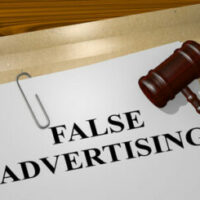When Can You Bring a Lanham Act Claim Against a Competitor for False Advertising?

If you can prove that your competitor’s advertising is false, untrue, or misleading, you may be able to bring a claim under the Lanham Act. Specifically, you could sue your competitor under 15 U.S. Code § 1125 (the Lanham Act) to:
- Seek an injunction against the competitor’s false advertising;
- Recover damages; and
- In some cases, seek attorney’s fees.
If your competitor has engaged in false advertising, contact a Tampa business attorney at HD Law Partners immediately.
What is ‘false advertising’ under the Lanham Act?
Your competitor may violate the false advertising section of the Lanham Act when it uses any oral or written statements that are likely to mislead consumers in an attempt to influence their buying behavior.
The following types of advertisement can contain false or misleading advertising:
- TV or radio ads
- Written advertisements
- Ads on the internet
- Email and social media promotions
- Website ads
- Pamphlets
- Labels
Also, you can sue your competitor under the Lanham Act if they use trademarks that confuse or deceive consumers.
How to prove false advertising under the Lanham Act?
In order to bring a false advertising claim under the Lanham Act, you must establish the following elements:
- There was a false or misleading statement of fact. You can take legal action against your competitor under the Lanham Act if their statements are “literally false” or “literally true” but deceive or are likely to deceive, mislead, or confuse consumers.
- The statement was used in the competitor’s commercial advertisement or promotion. See the above-mentioned list of commercial advertisement types to understand what kinds of advertisements are eligible for protection under the Lanham Act.
- The competitor’s false advertising is likely to deceive consumers in a “material way.” Generally, Florida courts presume that literally false advertising deceives a consumer in a “material way.” However, the wronged party may not need to demonstrate evidence of materiality if the competitor acted in bad faith or engaged in willful conduct.
- You have suffered or are likely to suffer a competitive or commercial injury due to the false or misleading statement. If you are trying to recover damages, you will need to show proof of actual harm suffered as a result of the competitor’s false advertising. However, in order to seek an injunction against false advertising, you may only need to show that your competitive or commercial injury was likely to happen.
Why do you need to file a false advertising lawsuit under the Lanham Act?
If you prevail in your false advertising claim under the Lanham Act, you can obtain an injunction preventing your competitor from continuing to use or spread false advertising.
In many cases, courts may also require the competitor to publish corrections of false statements. If false advertising caused financial losses or actual damages, the court might order the competitor to pay for the plaintiff’s damages.
If your competitor is using false advertising or making misleading statements to promote its products or services in a way that (a) deceives customers and (b) causes or is likely to cause you damages, you may be able to file a false advertising lawsuit under the Lanham Act.
Consult with our business law attorneys at HD Law Partners to discuss your case and determine whether you can sue your competitor for making false or misleading statements. Call 813-964-7878 to receive a consultation.





